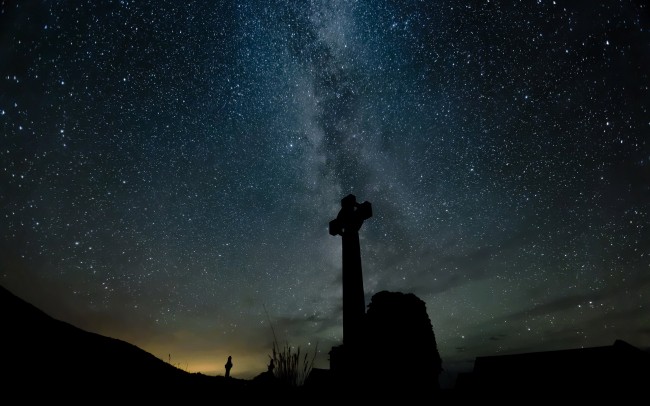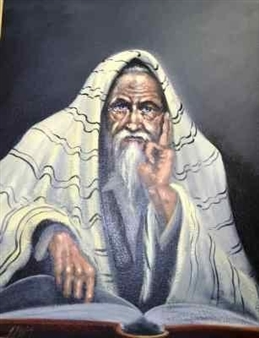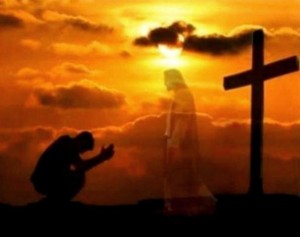And now my head will be lifted up above my enemies around me, and I will offer in His tent sacrifices with shouts of joy; I will sing, yes, I will sing praises to the LORD. (Psalm 27:6)
 We now see the result of being lifted up—in plain sight—on a rock. It’s not a matter of sight; rather it is a matter of power. He has been exalted, set on high, over his enemies. Yes they do indeed surround David, but it is of no consequence, because He is the one with power and authority, not they. And David knows full well where that power and authority come from.
We now see the result of being lifted up—in plain sight—on a rock. It’s not a matter of sight; rather it is a matter of power. He has been exalted, set on high, over his enemies. Yes they do indeed surround David, but it is of no consequence, because He is the one with power and authority, not they. And David knows full well where that power and authority come from.
So here’s David, being set upon a rock by the Most High, given power and authority over his enemies. And what does he do? Worship. This is huge.
There were at least two distractions here, but David fixes his eyes upon the LORD.
He could have been caught up in his position.
He could have been caught up in being surrounded.
But his enemies we not an issue, not a concern. Rather he worshiped the LORD.
So he turned his back upon the circumstances and turned his attention upon the LORD.
There were three things David did in worship:
Offer sacrifices.
This is the literal act of offering sacrifices. I suppose these sacrifices could have been either the Burnt Offering or the Peace Offering. The former for commemoration or celebration; the latter as a means of thanksgiving.
Shouts of joy.
These shouts could actually be a cry for help, or a battle cry, a trumpet blast. And it is quite likely the surrounding enemies could have confused these cries. But only at the outset, not at the outcome. David wasn’t signaling his troops, he was offering sacrifices. He wasn’t pointing his troops for attack, he was looking unto his God. There were no war cries, and if they listened carefully, even his enemies would have heard the joy.
Sing praises.
This could be translated as to make music. Did David pull out his harp? Did he compose a new song on the spot? Maybe this Psalm? Did some of his warriors join in a male chorus? Or was he alone, singing a solo song of worship to the LORD? I suspect it was simpler rather than more elaborate. Just the king worshiping the King of kings.
Imagine the impact this should have had on his observers.
They had lost their advantage, had lost their power.
They see they are of no concern for David.
They see worship of the One True God.
They see the relationship that David had with the LORD.
They see the power of God.
What do you think their response might be? How many would understand, and how many would walk away in frustration?
Now, here’s the application for you and me. When you’re in the midst of a crisis, what do you do? Are you distracted by the disaster? Are you preoccupied by the predicament? Are you overwhelmed by the by the onslaught? Do not be. Intentionally choose to worship. Follow David’s example: turn away from the tribulation, and turn to worship. The following verse reveals that we too have been given the ability to turn away and also shows to Whom we should turn:
But now, thus says the LORD, your Creator, O Jacob, and He who formed you, O Israel, “Do not fear, for I have redeemed you; I have called you by name; you are Mine! When you pass through the waters, I will be with you; and through the rivers, they will not overflow you. When you walk through the fire, you will not be scorched, nor will the flame burn you. For I am the LORD your God, the Holy One of Israel, your Savior”. (Isaiah 43:1-3a)

 The day of trouble. Sounds ominous. And the Hebrew word for trouble has darker translations: calamity, disaster, and wickedness are the three most used. Here are the other occurrences of this specific phrase.
The day of trouble. Sounds ominous. And the Hebrew word for trouble has darker translations: calamity, disaster, and wickedness are the three most used. Here are the other occurrences of this specific phrase.
 So what’s the context here? Why did God come down? We begin in verse 6:
So what’s the context here? Why did God come down? We begin in verse 6:
 You ever wonder about the personal pronouns in the Bible? They are there for several reasons (and not just grammatical), and here are a few:
You ever wonder about the personal pronouns in the Bible? They are there for several reasons (and not just grammatical), and here are a few: distance between heaven and earth as an illustration of how great God’s mercy is. And the distance between east and west, an illustration of how far God has removed our sin from us.
distance between heaven and earth as an illustration of how great God’s mercy is. And the distance between east and west, an illustration of how far God has removed our sin from us.